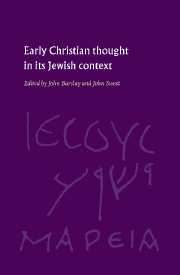Book contents
- Frontmatter
- Contents
- List of contributors
- Preface
- List of works by Morna D. Hooker
- List of abbreviations
- Chapter 1 Introductory Essay
- I THE SOCIAL CONTEXT OF EARLY CHRISTIANITY
- II SOME EARLY CHRISTIAN SOURCES
- Chapter 4 Jesus
- Chapter 5 Matthew
- Chapter 6 Mark
- Chapter 7 Luke–Acts
- Chapter 8 John
- Chapter 9 Paul
- Chapter 10 Deutero-Pauline letters
- Chapter 11 Hebrews
- Chapter 12 Revelation
- Chapter 13 Other early Christian writings: ‘Didache’, Ignatius, ‘Barnabas’, Justin Martyr
- III SOME EARLY CHRISTIAN THEMES
- Index of names
- Index of subjects
- Index of texts
Chapter 6 - Mark
from II - SOME EARLY CHRISTIAN SOURCES
Published online by Cambridge University Press: 22 September 2009
- Frontmatter
- Contents
- List of contributors
- Preface
- List of works by Morna D. Hooker
- List of abbreviations
- Chapter 1 Introductory Essay
- I THE SOCIAL CONTEXT OF EARLY CHRISTIANITY
- II SOME EARLY CHRISTIAN SOURCES
- Chapter 4 Jesus
- Chapter 5 Matthew
- Chapter 6 Mark
- Chapter 7 Luke–Acts
- Chapter 8 John
- Chapter 9 Paul
- Chapter 10 Deutero-Pauline letters
- Chapter 11 Hebrews
- Chapter 12 Revelation
- Chapter 13 Other early Christian writings: ‘Didache’, Ignatius, ‘Barnabas’, Justin Martyr
- III SOME EARLY CHRISTIAN THEMES
- Index of names
- Index of subjects
- Index of texts
Summary
More than once in her work on the gospel of Mark, Morna Hooker has emphasized continuity as well as discontinuity in the evangelist's treatment of the relationship between Christianity and Judaism. A gospel written before the break with Judaism had necessarily to be understood within, rather than outside, that context. We would therefore expect a priori that both of two ‘givens’ – the experience of Christ and the debt to Judaism – would define the evangelist's agenda. And so indeed it proves.
JESUS, THE LAW AND THE PEOPLE OF GOD
Readers of the gospel of Mark had received the gospel of the Son of God, brought to them with authority derived from God himself (9.37). The ethnic background of those readers appears to have been mixed. A mission to ‘all the nations’ (13.10; cf. 14.9) necessarily includes Jews as well as non-Jews in its horizon. For when that phrase occurs elsewhere, as it does just once, the temple is declared to be ‘a house of prayer for all the nations’ (11.17), and there can be no doubt that its horizon includes the Jewish people. It is no surprise, therefore, that the missionaries are warned of ill feeling and beating in synagogues (13.9, 13). Activity there clearly remains a commitment for them just as it had been for Jesus (1.21, 39; 3.1; 6.2). Since success in mission among both Jews and non-Jews must be presupposed by the Marcan scheme, it was a mixed community that had been brought into being.
- Type
- Chapter
- Information
- Early Christian Thought in its Jewish Context , pp. 70 - 83Publisher: Cambridge University PressPrint publication year: 1996

